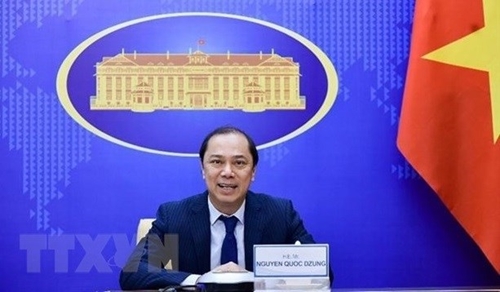During the talks, Dung, Campbell and Kritenbrink expressed their delight at the practical and effective development of the Vietnam-U.S. comprehensive partnership in all spheres, thereby bringing benefits to people of both nations and contributing to the maintenance of peace, stability, cooperation and development in the Indo-Pacific region and the world as well.
Dung proposed that in order to further deepen the bilateral ties, the two sides should increase meetings and dialogues, especially at the high level, while promoting economic, trade and investment cooperation within the Trade and Investment Framework Agreement (TIFA).
    |
 |
|
Vietnamese Deputy Minister of Foreign Affairs Nguyen Quoc Dung |
Dung highly valued the U.S.’s commitments to continue increasing the budget for overcoming war consequences in Vietnam, to establish the Southeast Asian office of the U.S. Centers for Disease Control and Prevention in Hanoi and U.S.-funded projects in Vietnam, including the Fulbright University Vietnam. Vietnam hoped that the U.S. will continue supporting Vietnam in the areas of education-training, health care, digital economy, and climate change, he said.
For their part, Campbell and Kritenbrink affirmed that the U.S. highly evaluated the comprehensive partnership with Vietnam and wanted to further lift the bilateral relationship to a new height.
They showed pleasure at Vietnam’s efforts to realize the country’s commitments set out in the action plan towards a balanced, harmonious and sustainable trade between the two countries, and lauded the strong commitment given by Prime Minister Pham Minh Chinh at the 26th U.N. Climate Conference of the Parties (COP26) on net-zero emissions by 2050. The U.S. will continue to strengthen cooperation with and assistance to developing countries, including Vietnam, in responding to climate change, they pledged.
On this occasion, Dung expressed the wish that the U.S. will continue to promote comprehensive, sustainable and inclusive cooperation with the region, support the intra-bloc unity and the central role of the Association of Southeast Asian Nations (ASEAN), and further strengthen the ASEAN-U.S. strategic partnership, and the Mekong-U.S. partnership.
The two sides also discussed regional and international matters, including the East Sea (South China Sea) issue. They agreed to enhance cooperation within the framework of the United Nations as well as other multilateral forums, thus contributing to peace, stability, security and development in the region and the world.
Source: VNA